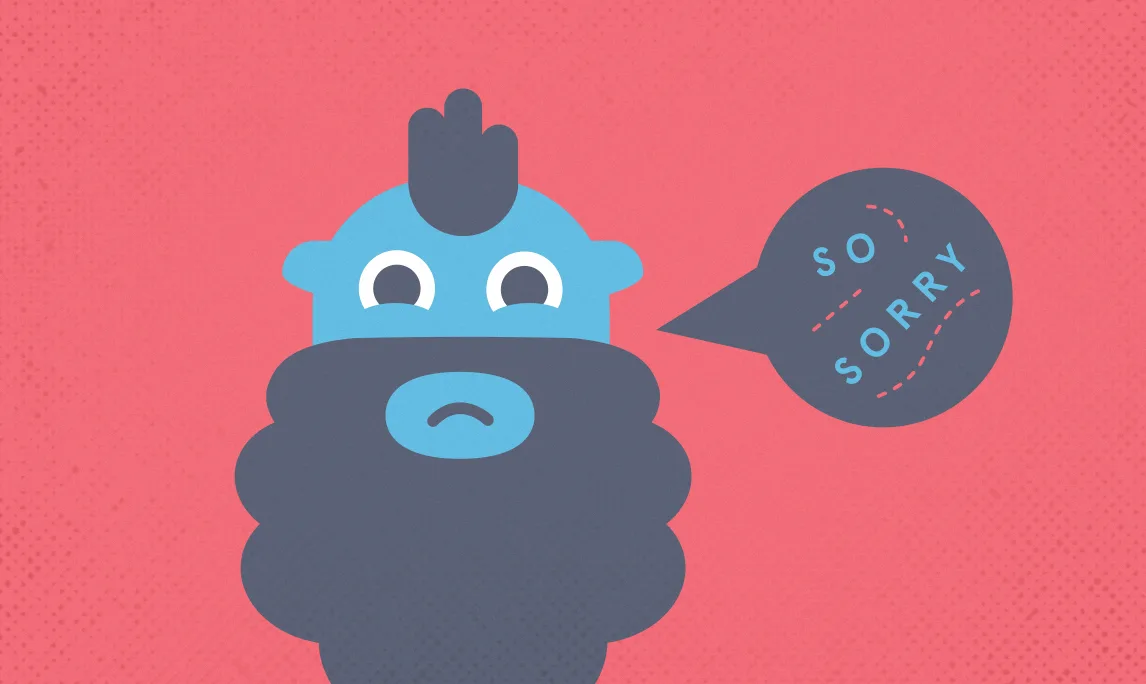Sorry, not sorry
As I shuffle through crowds on my morning commute, I find myself muttering the same thing, over and over, “Sorry…oh, um, sorry…uh, sorry…” Avoiding others’ gaze, I use the word ‘sorry’ casually, pre-emptively, often passive-aggressively, but the art of apologizing is nuanced. Even though I can apologize to strangers in crowds with ease and often without necessity, when it’s actually important to apologize, the word ‘sorry’ gets stuck in my throat. When I fight with my sister (which is more than I’d like), I stubbornly suppress feelings of guilt and anger, and I find it very difficult to apologize.
Asking for her perspective on the matter, it turns out she too finds it hard to apologize to me, “I’m afraid the guilt will overwhelm me.” Facing our missteps means facing up to feelings of insecurity, the potential instability of a relationship, or the slightly murkier parts of our character. So why is the word ‘sorry’ the first one I say most mornings? On the most literal level, it’s an acknowledgement for being in the way, despite the fact that during our morning commutes, we are all in each other’s way. It feels an awful lot like an apology for merely existing and taking up room. Apologizing needlessly or out of place makes me feel small and diminished. Though saying sorry can look like a form of undervaluing oneself, and perhaps evidence of low self-esteem, “people who are sure of themselves have the capacity to confess to wrongdoing and address it,” says psychologist Andrew Howell. Those who are more self-conscious, on the other hand, tend to avoid such conversations.
The way we handle conflict, whether passively, aggressively, or passive-aggressively, speaks to the likelihood of our offering up a plea for forgiveness. A friend shared, “I have no problem saying sorry... sometimes it’s just easier to end the argument,” showing an assertiveness and willingness to restore harmony to the relationship. And certainly, an appropriately offered apology brings two people back to common ground, empowering the offended party with the opportunity to forgive. Rather than diminishing us, apologizing sincerely and when appropriate, expands us. In acknowledging another’s pain, we become the bigger person and inhabit our most empathetic selves. There are times though when saying sorry just isn’t enough for some people. A recent story mentions a motorcycle gang leader who, realizing that saying sorry wasn’t enough to make up for a serious transgression, removed his own little finger. “I made the biggest mistake of my life. And there was no other way for me to…prove my respect and my understanding of how badly I messed up than to, uh, offer up a part of myself.” Though actions sometimes do speak louder, words establish an understanding and foundation from which healing can begin. And they allow you to, in most cases, keep your fingers intact.
Perhaps more powerful than this is the recognition that we can carry ourselves differently. Not saying ‘sorry’ when what you mean is ‘thank you’, ‘excuse me’, or ‘do you mind if I…?’ is both affirming and empowering. Indeed, saying what you mean may even save you a ’sorry’ down the road. Recognizing the difference can be as simple as slowing down and tuning in to the world around us. When we are apologetic, we have the opportunity to maintain and renew relationships. But the chance for growth lies in the awareness of how we communicate with each other in the first place. These days as I make my morning journey to work, I try to acknowledge the words I use. If somebody makes room for me to squeeze onto the train first, I consciously look them in the eye, say “thank you,” and feel just a little lighter.

the chance for growth lies in the awareness of how we communicate with each other in the first place.
Sadia Ahmad


Be kind to your mind
- Access the full library of 500+ meditations on everything from stress, to resilience, to compassion
- Put your mind to bed with sleep sounds, music, and wind-down exercises
- Make mindfulness a part of your daily routine with tension-releasing workouts, relaxing yoga, Focus music playlists, and more
Meditation and mindfulness for any mind, any mood, any goal

Stay in the loop
Be the first to get updates on our latest content, special offers, and new features.
By signing up, you’re agreeing to receive marketing emails from Headspace. You can unsubscribe at any time. For more details, check out our Privacy Policy.
- © 2025 Headspace Inc.
- Terms & conditions
- Privacy policy
- Consumer Health Data
- Your privacy choices
- CA Privacy Notice
